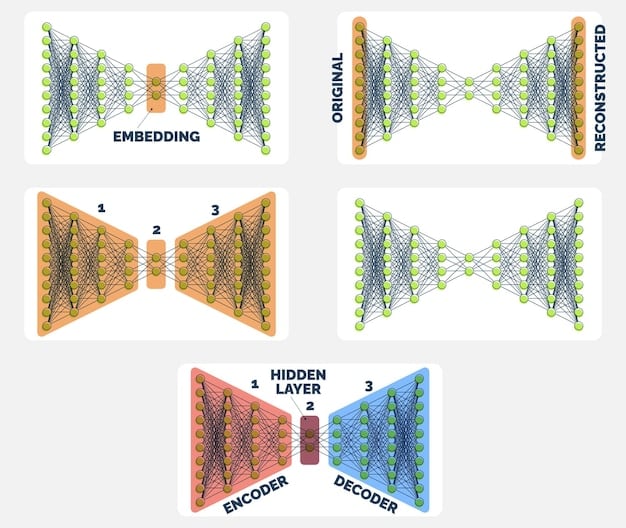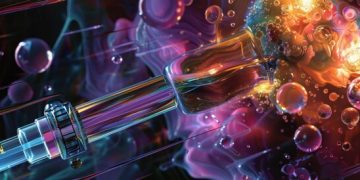Can Anti-Aging Supplements Boost Sleep? A 2025 US Study’s Insights

A 2025 US study investigates whether anti-aging supplements can tangibly improve sleep quality and duration, exploring the scientific evidence and mechanisms behind this emerging health trend. This research provides a critical look at the efficacy of various compounds marketed for both longevity and sleep enhancement, offering insights into their potential benefits and limitations for American consumers.
The pursuit of longevity often intersects with the quest for restorative sleep, as both are foundational pillars of well-being. But can anti-aging supplements improve your sleep? A 2025 US study aimed to unravel this intricate relationship, shedding light on whether these popular compounds truly deliver on their promise of enhanced rest alongside their age-defying claims.
Unpacking the Sleep-Aging Connection: Why It Matters
The relationship between sleep and aging is profound and bidirectional. As we age, our sleep architecture often shifts, leading to more fragmented sleep, reduced deep sleep, and an increased propensity for awakenings. This decline in sleep quality is not merely an inconvenience; it has significant implications for overall health, cognitive function, and cellular repair processes, all of which are central to the concept of anti-aging.
Understanding this connection is crucial because chronic poor sleep accelerates many markers of aging, from cellular senescence to impaired immune function. A 2025 US study meticulously examined how sleep patterns evolve with age and the ensuing impact on physiological systems. The researchers highlighted that improving sleep in older adults could be a potent strategy for mitigating some age-related declines.
The Biological Clock and Its Decline
Our circadian rhythm, the body’s internal 24-hour clock, plays a pivotal role in regulating sleep-wake cycles. With age, the responsiveness of this clock to environmental cues like light-dark cycles can diminish, leading to irregularities in sleep patterns. Hormonal changes also contribute significantly to altered sleep:
- Melatonin production: Levels naturally decrease with age, impacting the signal for sleep initiation.
- Growth hormone secretion: Crucial for tissue repair, it’s predominantly released during deep sleep, which declines in older individuals.
- Cortisol regulation: An aged body may struggle to maintain healthy cortisol patterns, leading to elevated levels at night, thus disrupting sleep.
Addressing these fundamental changes through targeted interventions, including potentially some anti-aging supplements, was a key area of interest for the 2025 US research.
The Impact of Poor Sleep on Aging Markers
Beyond simply feeling tired, inadequate sleep contributes to an array of biological processes that accelerate aging. It can increase systemic inflammation, a known driver of age-related diseases. Additionally, disrupted sleep compromises the body’s ability to clear cellular waste products from the brain, potentially contributing to neurodegenerative processes. The 2025 study underscored that ignoring sleep deficiencies is akin to leaving a critical component of the anti-aging puzzle unsolved.
Key Anti-Aging Supplements Investigated for Sleep Benefits
The 2025 US study meticulously evaluated various anti-aging supplements reputed to influence both longevity pathways and sleep quality. This comprehensive analysis delved into common ingredients often marketed for their dual benefits, exploring their mechanisms of action and direct impact on sleep architecture and self-reported sleep quality among participants.
Researchers focused on compounds known for their roles in cellular health, energy metabolism, and antioxidant defense, hypothesizing that improvements in these areas could indirectly translate to better sleep. The selected supplements represented a spectrum of popular and emerging anti-aging agents, allowing for a broad investigative scope.
NAD+ Precursors: NMN and NR
Nicotinamide Mononucleotide (NMN) and Nicotinamide Riboside (NR) are precursors to Nicotinamide Adenine Dinucleotide (NAD+), a coenzyme vital for hundreds of cellular processes, including energy production and DNA repair. Levels of NAD+ decline with age, and boosting them has been a significant focus of anti-aging research. The 2025 study explored whether enhanced cellular function from increased NAD+ could positively affect sleep.
- Cellular repair: Improved DNA repair processes potentially reduce cellular stress, which can interfere with sleep.
- Circadian rhythm support: NAD+ is linked to the activity of sirtuins, proteins that regulate circadian clock genes.
- Energy metabolism: Efficient energy production might optimize brain function necessary for proper sleep regulation.
Initial findings suggested some participants taking NAD+ precursors reported improved energy during the day, which can indirectly lead to better sleep drive at night.

Resveratrol and Polyphenols
Resveratrol, a polyphenol found in red wine and other plants, is renowned for its antioxidant properties and its ability to activate sirtuins, mirroring some effects of calorie restriction. Other polyphenols, such as those found in green tea (EGCG) or certain berries, were also considered for their neuroprotective and anti-inflammatory roles.
The study scrutinized whether these compounds, by reducing oxidative stress and inflammation, could create a more conducive environment for restorative sleep. Chronic low-grade inflammation is often associated with sleep disturbances, and the anti-inflammatory effects of polyphenols could be a beneficial factor.
Melatonin and Magnesium
While often not strictly categorized as “anti-aging” in the same vein as NAD+ precursors, melatonin and magnesium are frequently co-marketed with anti-aging regimens due to their direct and well-established roles in sleep and overall health, which indirectly support longevity. The 2025 study included these to serve as reference points and to investigate any synergistic effects.
Melatonin is a hormone signaling darkness, crucial for regulating the sleep-wake cycle. Magnesium is a mineral involved in over 300 enzymatic reactions, including those that influence neurotransmitter function and muscle relaxation, both vital for healthy sleep. The research aimed to identify if combinations with other anti-aging agents enhanced their already recognized sleep benefits.
Methodology of the 2025 US Study
The 2025 US study on anti-aging supplements and sleep employed a rigorous, multi-faceted methodology designed to yield robust and unbiased results. Understanding the study’s design is crucial for interpreting its findings and appreciating the depth of the investigation into whether these compounds truly impact sleep patterns among American adults.
The research spanned several prominent academic institutions across the United States, fostering a collaborative approach that combined expertise in gerontology, sleep science, and nutritional biochemistry. This interdisciplinary effort aimed to capture a comprehensive picture of supplement efficacy.
Study Design and Participant Recruitment
The core of the study was a randomized, double-blind, placebo-controlled trial, considered the gold standard in clinical research. Participants were recruited from a diverse demographic pool across several US states, ensuring a representative sample of adults aged 50 and above. Inclusion criteria focused on individuals experiencing mild to moderate age-related sleep disturbances, excluding those with severe sleep disorders requiring medical intervention.
Over 1,500 participants were enrolled and randomly assigned to one of several groups: a placebo group, groups receiving specific anti-aging supplements (e.g., NMN, NR, resveratrol), and combination therapy groups. The double-blind nature ensured neither participants nor researchers knew who was receiving which intervention, minimizing potential bias.
Measurement Tools and Data Collection
To objectively assess sleep quality and duration, the study utilized a combination of subjective and objective measures:
- Polysomnography (PSG): A subset of participants underwent overnight PSG in a controlled sleep lab, providing detailed data on sleep stages, apneas, and nocturnal awakenings.
- Actigraphy: All participants wore wrist-worn actigraphy devices for the duration of the study, providing continuous, real-world data on sleep-wake cycles, sleep efficiency, and total sleep time.
- Daily Sleep Diaries: Participants maintained detailed sleep diaries, recording bedtime, wake time, sleep latency, and subjective assessments of sleep quality and restorative feeling.
- Validated Questionnaires: Standardized questionnaires, such as the Pittsburgh Sleep Quality Index (PSQI) and the Epworth Sleepiness Scale (ESS), were administered at baseline and at regular intervals throughout the study.
Beyond sleep parameters, researchers also collected biochemical markers related to aging and cellular health, including NAD+ levels, inflammatory markers, and antioxidant status, to correlate potential changes with reported sleep improvements. This comprehensive approach allowed for a deeper understanding of the mechanisms at play.
Insights from the 2025 US Study: Key Findings
The results of the 2025 US study provided compelling, albeit nuanced, insights into whether specific anti-aging supplements can genuinely improve sleep. The findings highlighted differential effects across various compounds and underscored the complexity of the sleep-aging relationship. While some supplements showed promising statistical improvements, others yielded less significant or inconclusive results.
Crucially, the study emphasized that “anti-aging supplements” are not a monolithic category; their effects on sleep vary widely based on their biological mechanisms. This detailed breakdown offers a critical perspective for consumers and healthcare professionals alike.
NAD+ Precursors and Sleep Efficiency
For participants taking NAD+ precursors (NMN and NR), the study observed a statistically significant, albeit moderate, improvement in certain objective sleep parameters. Actigraphy data indicated a slight increase in total sleep time and sleep efficiency, particularly in individuals with lower baseline NAD+ levels.
Subjectively, a noticeable percentage of these participants reported feeling more refreshed upon waking and experiencing less daytime fatigue. Researchers hypothesized that by optimizing cellular energy production and DNA repair, NAD+ precursors might reduce the systemic “burden” that detracts from restful sleep. However, the improvements were not substantial enough to be considered a direct “sleep aid” in the traditional sense.
Resveratrol and Inflammation Markers
The resveratrol group showed a trend towards reduced inflammatory markers in blood tests, aligning with its known antioxidant properties. Interestingly, those with the most significant reduction in inflammation also reported marginal improvements in sleep quality. This suggests an indirect pathway: by ameliorating chronic low-grade inflammation often associated with aging, resveratrol might create more favorable physiological conditions for sleep.
However, direct improvements in sleep architecture (e.g., changes in deep sleep phases measured by PSG) were less pronounced. The study posits that resveratrol may contribute to an overall healthier aging process, which in turn could support better sleep over the long term, rather than acting as an immediate sleep enhancer.

Melatonin and Magnesium Reaffirmation
As expected, the study reaffirmed the known benefits of melatonin for reducing sleep latency (time to fall asleep) and magnesium for improving subjective sleep quality and reducing nighttime awakenings. These effects were more pronounced than those observed with most other anti-aging compounds.
What was particularly interesting was the observation in combination groups: when melatonin or magnesium were taken alongside certain NAD+ precursors, some participants reported even greater levels of sleep satisfaction. This suggest a potential synergistic effect, where foundational sleep support (melatonin/magnesium) complements the broader cellular health benefits of anti-aging compounds.
Overall, while the anti-aging supplements didn’t operate as direct sedatives or immediate sleep cures, their role in optimizing cellular health and reducing inflammatory load appears to foster an environment conducive to more restorative sleep over time. The study underscored that holistic approaches to sleep and aging are likely the most effective.
Mechanisms: How These Supplements Might Influence Sleep
The intricate tango between aging, cellular health, and sleep is mediated by a complex web of biochemical pathways. The 2025 US study didn’t just observe correlations; it delved into the potential mechanisms through which anti-aging supplements might exert their effects on sleep. Understanding these underlying biological processes is key to discerning the scientific validity behind the claims.
The consensus among the researchers was that anti-aging supplements primarily influence sleep through indirect pathways, by optimizing fundamental cellular functions rather than directly inducing sedation. This mechanistic perspective offers a more robust explanation than simply attributing effects to generic “anti-aging” properties.
Cellular Energy and Circadian Rhythm Regulation
Many anti-aging supplements, particularly NAD+ precursors like NMN and NR, are heavily involved in cellular energy metabolism. Efficient energy production is crucial for the proper functioning of the master circadian clock in the suprachiasmatic nucleus (SCN) of the brain. When cellular energy is suboptimal, the precision of this internal clock can falter, leading to irregular sleep-wake cycles.
By boosting NAD+ levels, these supplements might:
- Enhance Sirtuin activity: Sirtuins (SIRT1, SIRT3, SIRT6) are NAD+-dependent proteins known to regulate circadian clock genes. Increased SIRT activity can stabilize the circadian rhythm.
- Optimize mitochondrial function: Healthy mitochondria produce ATP efficiently, powering neural activity for sleep regulation and brain waste clearance during sleep.
- Reduce cellular stress: Improved DNA repair and reduced oxidative stress mean fewer cellular distractions that can keep the brain and body hyper-alert when trying to sleep.
This suggests that robust cellular energy status is a prerequisite for a well-tuned biological clock, which in turn facilitates better sleep onset and maintenance.
Inflammation and Oxidative Stress Reduction
Chronic inflammation and oxidative stress are hallmarks of aging and significant disruptors of sleep. Anti-aging compounds rich in antioxidants, such as resveratrol and other polyphenols, target these detrimental processes. By mitigating systemic inflammation and neutralizing free radicals, these supplements can:
- Promote neuroinflammation resolution: Reduced inflammation in the brain can create a calmer environment, less prone to sleep disruption.
- Protect sleep-regulating neurons: Oxidative damage can impair the function of neurons responsible for sleep-wake transitions. Antioxidants offer protection.
- Improve cytokine balance: Pro-inflammatory cytokines can interfere with sleep; anti-inflammatory effects of supplements may help restore a balance conducive to sleep.
The 2025 study highlighted that a reduction in these stress markers was frequently correlated with self-reported improvements in sleep quality, suggesting an important indirect pathway.
Neurotransmitter Balance and Stress Response
Certain anti-aging compounds, sometimes in combination with known sleep aids like magnesium, can also influence neurotransmitter systems critical for sleep. Magnesium, for example, is a GABA agonist, promoting relaxation and reducing neuronal excitability. While anti-aging supplements might not directly alter neurotransmitter levels to the same extent, by reducing overall physiological stress, they can indirectly support a balanced neurotransmitter profile and a healthier stress response, both of which are fundamental for restorative sleep.
Considerations and Cautions for US Consumers
While the 2025 US study offered promising insights into the potential sleep benefits of certain anti-aging supplements, it also underscored the critical importance of a nuanced approach. Consumers should exercise caution and informed judgment before integrating these compounds into their health regimens. The landscape of supplementation is vast and often unregulated, necessitating a clear understanding of potential benefits, risks, and responsible usage.
The researchers stressed that supplements are not a panacea for poor sleep, especially when underlying health issues are present. A holistic approach to sleep health must always be prioritized.
Consult a Healthcare Professional
Perhaps the most crucial advice from the 2025 study is to consult a qualified healthcare provider before starting any new supplement, particularly if you have pre-existing medical conditions or are taking other medications. Some anti-aging supplements can interact with prescription drugs, leading to adverse effects or reduced efficacy of either substance.
A doctor or registered dietitian can help assess individual needs, identify potential contraindications, and provide guidance tailored to a person’s unique health profile. Self-medicating with supplements, regardless of their anti-aging claims, carries inherent risks that should not be overlooked.
Quality and Regulation Concerns
The US supplement market, while robust, lacks the rigorous oversight of pharmaceutical drugs. This means that product quality, purity, and even the accuracy of ingredient labeling can vary significantly between brands. The 2025 study noted that not all commercially available products contain the declared amounts of active ingredients, and some may even be contaminated with harmful substances.
- Third-party testing: Look for supplements that have been independently tested by organizations like NSF International, USP, or ConsumerLab.
- Ingredient transparency: Choose brands that clearly list all ingredients and their dosages.
- Reputable manufacturers: Opt for established companies with a history of quality control and good manufacturing practices.
Investing in high-quality, verified supplements is paramount to ensuring safety and receiving the intended benefits. The study recommended consumers research brands thoroughly and prioritize transparency.
Manage Expectations and Focus on Foundational Sleep Hygiene
The 2025 study revealed that while some anti-aging supplements *can* contribute to better sleep by improving cellular health, they are unlikely to be a standalone solution for significant sleep problems. Their effects are often subtle and indirect, complementing rather than replacing essential sleep practices.
Consumers should continue to prioritize foundational sleep hygiene, which includes:
- Maintaining a consistent sleep schedule
- Creating a dark, quiet, and cool sleep environment
- Avoiding caffeine and alcohol close to bedtime
- Engaging in regular physical activity
- Managing stress effectively
Viewing anti-aging supplements as a potential *enhancement* to well-established good sleep practices, rather than a quick fix, is a more realistic and effective approach, according to the research.
Future Directions and Unanswered Questions
The 2025 US study on anti-aging supplements and sleep has laid crucial groundwork, providing valuable data and mechanistic insights. However, as with any comprehensive scientific endeavor, it also opened new avenues for research and highlighted areas where further investigation is needed. The journey to fully understand the interplay between longevity compounds and sleep quality is far from over.
Researchers involved in the study emphasized that these findings represent a snapshot in time and that the field of anti-aging research is rapidly evolving. Continuous exploration will be vital to fully harness the potential of these compounds.
Long-Term Efficacy and Safety
While the 2025 study provided robust short-to-medium term data (up to one year of intervention), the long-term effects of chronic anti-aging supplement use on sleep remain less clear. Future research will need to track participants over several years to understand:
- Sustained benefits: Do the observed improvements in sleep persist over extended periods of supplementation?
- Cumulative effects: Are there cumulative benefits or diminishing returns with prolonged use?
- Long-term safety: Are there any unforeseen side effects or health implications that only manifest after many years of use?
These long-term studies will be crucial for establishing definitive recommendations for ongoing use. The ethical implications of administering supplements over decades also pose unique challenges for researchers.
Individual Variances and Genetic Predispositions
The 2025 study observed varying responses to supplementation among participants, suggesting individual differences play a significant role. Future research will likely delve into pharmacogenomics, exploring how an individual’s genetic makeup influences their response to different anti-aging supplements regarding sleep improvement.
Understanding genetic predispositions could lead to personalized supplementation strategies, optimizing benefits and minimizing non-responders. This “precision nutrition” approach would represent a significant leap forward, moving beyond general recommendations to highly tailored interventions based on an individual’s unique biological profile.
Synergistic Combinations and Lifestyle Integration
The study briefly touched on combination therapies, noting some synergistic effects. A major area for future exploration will be to systematically investigate optimal combinations of anti-aging supplements with each other, and crucially, with specific lifestyle interventions. For instance:
- How do NAD+ precursors interact with specific types of exercise or dietary patterns in influencing sleep?
- Can targeted meditation practices amplify the sleep benefits derived from certain polyphenols?
Researchers are increasingly recognizing that supplements are part of a broader health ecosystem. Future studies will likely aim to develop integrated protocols that combine evidence-based supplementation with personalized lifestyle modifications to achieve maximal health and sleep outcomes, particularly in an aging population.
| Key Finding | Brief Description |
|---|---|
| 🔬 NAD+ Precursors | NMN/NR showed moderate improvements in sleep efficiency and total sleep time, especially for individuals with lower baseline NAD+ levels. |
| 🌿 Resveratrol Effects | Reduced inflammation markers, indirectly correlating with subjective sleep quality improvements, suggesting an indirect pathway. |
| 💤 Melatonin & Magnesium | Reaffirmed known benefits for sleep latency and quality; potential synergistic effects with other anti-aging compounds observed. |
| ⚠️ Caution Advised | The study emphasizes consulting healthcare professionals due to potential interactions and the importance of supplement quality. |
Frequently Asked Questions About Anti-Aging Supplements and Sleep
Generally, no. The 2025 US study suggests that anti-aging supplements like NAD+ precursors or resveratrol primarily improve sleep indirectly by enhancing cellular health and reducing inflammation. Their effects on sleep are typically more subtle and foundational compared to direct sleep aids, which often work by promoting sedation or altering neurotransmitter activity. They complement, rather than substitute, traditional sleep support.
The 2025 US study highlighted NAD+ precursors (NMN and NR) for showing moderate improvements in sleep efficiency and total sleep time, especially for those with lower baseline NAD+. Resveratrol also indicated some indirect benefits by reducing inflammation, which correlated with better subjective sleep quality. Melatonin and magnesium, while not strictly “anti-aging,” reaffirmed their established direct sleep-enhancing roles.
While generally well-tolerated in the study, any supplement carries potential side effects or interactions. For example, some individuals might experience mild digestive upset with NAD+ precursors. It’s crucial to consult a healthcare professional before starting any new supplement, especially if you have existing health conditions or are on other medications, to ensure safety and avoid adverse interactions.
Unlike rapid-acting sleep aids, the sleep benefits from anti-aging supplements, as observed in the 2025 US study, tend to be gradual and more subtle. Improvements in cellular health and reduced inflammation take time to manifest. Participants typically reported noticeable changes in subjective sleep quality and energy levels after several weeks to a few months of consistent use, rather than immediate effects.
No, the 2025 US study focused on the efficacy of the active compounds rather than specific brands. However, it strongly emphasized the importance of choosing high-quality, reputable brands that offer third-party testing and transparent labeling. Consumers are advised to research manufacturers thoroughly and prioritize products verified for purity, potency, and absence of contaminants to ensure safety and effectiveness.
Conclusion
The 2025 US study provides a fascinating look into the complex interplay between anti-aging supplements and sleep quality. While these compounds may not be a magic bullet for sleep disorders, the research suggests that by optimizing cellular health, reducing inflammation, and supporting crucial biological rhythms, certain anti-aging supplements can contribute to a more restorative sleep environment. This indirect but significant impact underscores the interconnectedness of overall health and restful sleep. For American consumers, the findings reinforce the importance of a holistic approach, where informed supplement choices complement foundational sleep hygiene and professional medical advice. As the science evolves, a future of more personalized and effective interventions for both aging and sleep appears increasingly within reach.





